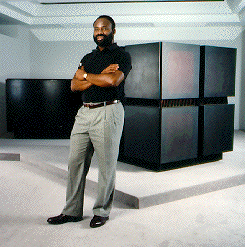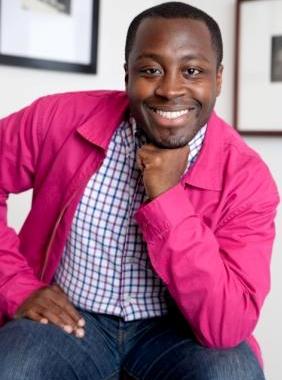By Philip Emeagwali
(Speech delivered at the University of Alberta, Canada,
September 23, 2006)
 I once believed that capital was another word for money, the
accumulated wealth of a country or its people. Surely, I thought,

wealth is determined by the money or property in one’s possession.
Then I saw a Deutsche Bank advertisement in the Wall Street Journal
that proclaimed: “Ideas are capital. The rest is just money.”
I was struck by the simplicity of such an eloquent and forceful
idea. I started imagining what such power meant for Africa. The
potential for progress and poverty alleviation in Africa relies on
capital generated from the power within our minds, not from our
ability to pick minerals from the ground or seek debt relief and
foreign assistance.
If ideas are capital, why is Africa investing more on things than on
information, and more on the military than on education? Suddenly, I
realized what this idea could mean for Africa. If the pen is
mightier than the sword, why does a general earn more than the work
of a hundred writers combined? If ideas are indeed capital, then
Africa should stem its brain drain and promote the African
Renaissance, which will lead to the rebirth of the continent. After
all, a renaissance is a rebirth of ideas. And knowledge and ideas
are the engines that drive economic growth.
When African men and women of ideas, who will give birth to new
ideas, have fled to Europe and the United States, then the so-called
African Renaissance cannot occur in Africa. It can only occur in
Paris, London and New York. There are more Soukous musicians in
Paris, than in Kinshasha; more African professional soccer players
in Europe, than in Africa. African literature is more at home abroad
than it is in Africa. In other words, Africans in Europe are
alleviating poverty in Europe, not in Africa. Until the men and
women of ideas – the true healers of Africa – start returning home,
the African Renaissance and poverty alleviation will remain empty
slogans. After all, the brightest ideas are generated and harnessed
by men of ideas.

The first annual report by J.P. Morgan Chase, a firm with assets of 1.3 trillion dollars, reads: “The power of intellectual capital is the ability to breed ideas that ignite value.” This quote is a
clarion call to African leaders to shift purposefully and
deliberately from a focus on things to a focus on information; from
exporting natural resources to exporting knowledge and ideas; and
from being a consumer of technology to becoming a producer of
technology.
For Africa, poverty will be reduced when intellectual capital is
increased and leveraged to export knowledge and ideas. Africa’s
primary strategy for poverty alleviation is to gain debt relief,
foreign assistance, and investments from western nations. Poverty
alleviation means looking beyond 100 percent literacy and aiming for
100 percent numeracy, the prerequisite for increasing our
technological intellectual capital. Yet, in this age of information
and globalization when poverty alleviation should result in
producing valuable products for the global market and competing with
Asia, the United States, and Europe – shamefully, diamonds found in
Africa are polished in Europe and re-sold to Africans.
The intellectual capital needed to produce products and services
will lead to the path of poverty alleviation. Intellectual capital,
defined as the collective knowledge of the people, increases
productivity. The latter – by driving economic growth – alleviates
poverty, always and everywhere, even in Africa. Productivity is the
engine that drives global economic growth.
Those who create new knowledge are producing wealth, while those who
consume it are producing poverty. If you attend a Wole Soyinka’s
production of Chinua Achebe’s “Things Fall Apart,” you consume the
knowledge produced by Soyinka and Achebe as well as the actor’s
production, much like I consume the knowledge and production of Bob
Marley’s through his songs.
We will need wisdom, that which turns too much information – or
information overload – into focused power, not only to process, but
also to evaluate the overwhelming amount of information available on
the Internet. This wisdom will give us the competitive edge and
enable us to find creative solutions.

The following story illustrates the difference between information
and wisdom. Twelve hundred years ago, in the city of Baghdad, lived
a genius named Al-Khwarizmi, who was one of the fathers of algebra.
In fact, the word algebra comes from the title of his book Al-jabr,
which for centuries was the standard mathematics textbook. Al-
Khwarizmi taught in an institution of learning called the House of
Wisdom, which was the center of new ideas during Islam’s golden age
of science. To this day we computer scientists honor Al-Khwarizmi
when we use the word algorithm, which is our attempt to pronounce
his name.
One day, Al-Khwarizmi was riding a camel laden down with algebraic
manuscripts to the holy city of Mecca. He saw three young men crying
at an oasis.
“My children, why are you crying?” he enquired.
“Our father, upon his death, instructed us to divide his 17 camels
as follows:
‘To my oldest son I leave half of my camels, my second son shall
have one-third of my camels, and my youngest son is to have one-
ninth of my camels.'”
“What, then, is your problem?” Al-Khwarizmi asked.
“We have been to school and learned that 17 is a prime number that
is, divisible only by one and itself and cannot be divided by two or
three or nine. Since we love our camels, we cannot divide them
exactly,” they answered.
Al-Khwarizmi thought for a while and asked, “Will it help if I offer
my camel and make the total 18?”
“No, no, no,” they cried.
“You are on your way to Mecca, and you need your camel.”
“Go ahead, have my camel, and divide the 18 camels amongst
yourselves,” he said, smiling.
So the eldest took one-half of 18 – or nine camels. The second took
one-third of 18 – or six camels. The youngest took one-ninth of 18 –
or two camels. After the division, one camel was left: Al-
Khwarizmi’s camel, as the total number of camels divided among the
sons (nine plus six plus two) equaled 17.
Then Al-Khwarizmi asked, “Now, can I have my camel back?”
These young men had information about prime numbers, but they lacked
the wisdom to use the information effectively. It is the
manipulation of information to accomplish seemingly impossible
purposes that defines true wisdom.
Today, we have ten billion pages of information posted on the
Internet – more than enough to keep us busy the rest of our lives,
and new information is being added daily. More information has been
created in the last 100 years than in all of the previous 100,000
years combined. We need the wisdom to sift through and convert these
billions of pages into information riches.
The genius of Al-Khwarizmi was not in his mathematical wizardry or
even his book knowledge: It was in his experiential knowledge – his
big-picture, right-brain thinking; creativity; innovation; and
wisdom. It was his wisdom to add a camel to make the total 18 and
still get his camel back.
Prime numbers are to whole numbers what the laws of physics are to
physics. Twenty years ago, I used an Al-Khwarizmi approach to solve
a notoriously difficult problem in physics. I added inertial force,
which enabled me to reformulate Newton’s Second Law of Motion first
as 18 equations and algorithms, and then as 24 million algebraic
equations. Finally, I programmed 65,000 “electronic brains” called
processors to work as one to solve those 24 million equations at a
speed of 3.1 billion calculations per second.
Like Al-Khwarizmi, I derived my 18 equations through out-of-the-box
thinking in an in-the-box world, adding my metaphorical camel:
inertial force. In other words, I applied wisdom to known knowledge
to generate intellectual capital.
Unless Africa significantly increases its intellectual capital, the
continent will remain irrelevant in the 21st century and even
beyond. Africa needs innovators, producers of knowledge, and wise
men and women who can discover, propose, and then implement
progressive ideas. Africa’s fate lies in the hands of Africans and
the solution to poverty must come from its people. The future that
lies ahead of Africa is for Africa to create, after the people have
outlined their vision. We owe it to our children to build a firm
foundation to enable them go places we only dreamt. For Africa to
take center stage in today’s economic world, we have to go out and
compete on a global basis. There is simply no other way to succeed.
Philip Emeagwali was voted history’s greatest scientist of African
descent – and the 35th greatest African of all time – in a survey
for the September 2004 issue of the London-based New African
magazine. He won the 1989 Gordon Bell Prize, the Nobel Prize of
supercomputing. To view the video recordings of this speech, visit
http://emeagwali.com .
Filed under: Cool Articles, Mr. Ambassador by !YG
No Comments »









